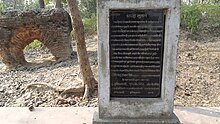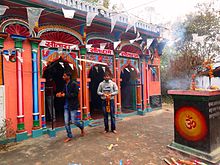Village in Uttar Pradesh, India
| Amorha Khas | |
|---|---|
| Village | |
 Raja Zalim Singh Memorial, Amorha Khas Raja Zalim Singh Memorial, Amorha Khas | |
  | |
| Coordinates: 26°45′45″N 82°23′38″E / 26.7625985°N 82.3938621°E / 26.7625985; 82.3938621 | |
| Country | |
| State | Uttar Pradesh |
| District | Basti |
| Tehsil | Harraiya |
| Population | |
| • Total | 5,977 |
| Languages | |
| • Official | Hindi |
| Time zone | UTC+5:30 (IST) |
| PIN | 272127 |
| Telephone code | 05546 |
| Vehicle registration | UP-51 |
Amorha Khas is a gram panchayat in Basti district in the Indian state of Uttar Pradesh. In the freedom struggle of 1857, about 250 martyrs of Amorha State were hanged by the British Government from peepal trees located at Chhawani.
Geography
Amorha Khas is located at 26°45′45″N 82°23′38″E / 26.7625985°N 82.3938621°E / 26.7625985; 82.3938621.



History
Amorha was ruled by the indigenous Bhar and Suryavanshi Kshatriya Rajputs drove out the Bhars by force and founded an estate known as the Amorha Raj.
Raja Zalim Singh was the King of Amorha. He was an Rajput of suryavanshi clan . He was married to sister of Raja uday pratap naryan singh of Nagar Raj(of Gautam Rajputs). Raja Zalim Singh along with the Nawab of Oudh fought against the British imperialists for India's Freedom Struggle. On 13th Aug 1857, the British imperialists realised it was very difficult to establish their rule in Amorha due to fierce resistance by the Raja. This forced the British officer, Col. Robert Craft, to back off from the region on 2nd Mar 1858. The last queen of Amorha, and the wife of Raja Zalim Singh, Rani Talash Kanwar(gautam rani), took arms against the British and was killed in a bloody battle.
Raja Zalim Singh was a brave Indian freedom fighter. He repulsed all British invasions in his region. He defended his territory against the British with utmost valour for a long time until one day when he was taken off guard and surrounded by the British army. He managed to escape via a secret tunnel and continued to fight guerrilla warfare against the British.
Demographics
As of 2011 India census, Amorha Khas is a large village located in Harraiya of Basti district, Uttar Pradesh with a total of 1009 families residing there. The Amorha Khas village has population of 5977 of which 2933 are males while 3044 are females as per Population Census 2011.
Famous places
Amorha Khas is situated at a distance of 41 km from the district headquarters. Its old name was Ambodha, and it was once a province (state) of Suryavanshi Rajput Raja Zalim Singh. Zalim Singh's Mahal is here, Old wall of mahal is still there with the mark of a bullet used by the English. Also a temple Ramrekha Mandir is here.

Gallery
References
- "Places of Interest". basti.nic.in. Archived from the original on 29 June 2016. Retrieved 9 June 2016.
- "AMODHA KHAS-Gram Panchayat - National Panchayat Portal - Govt. of India". panchayatportals.gov.in. Archived from the original on 4 March 2016. Retrieved 14 January 2017.
- News Desk, Harraiya Times. "Amodha – Chhawani : A Historical Place In Basti, Uttar Pradesh". Harraiya Times.
- "Google maps location of Amorha". Google maps. Retrieved 1 April 2013.
- Alexander, E. (1880). Statistical, Descriptive and Historical Account of the North-Western Provinces. Allahabad: North-Western Provinces and Oudh Government Press. p. 434. Retrieved 28 July 2020.
- "हमारे पितृ पुरुष:1857 में अंग्रेजों को धूल चटाई थी राजा नगर उदय प्रताप ने". Hindustan (in Hindi). Retrieved 19 August 2023.
- News Desk, Harraiya Times. "Amodha – Chhawani : A Historical Place In Basti, Uttar Pradesh". Harraiya Times (in Hindi).
The British appointed Deputy Collector Pippy in Wadepur, and for his assistance, half of the 12th Horse Regiment, known as Horse Riders, was deployed. They helped Pippy rescue Bushar. On June 20, 1857, the entire district was placed under martial law, and the village of Mahuadabar was set on fire, leading to a catastrophic event similar to the Jallianwala Bagh massacre. During this period, Raja Sayyad Husain Ali, also known as Mohammad Hasan (originally from Tanda, Akbarpur), the representative of the Nawab of Delhi and Awadh, sheltered Colonel Lennox, his wife, and daughter. However, the new collector, Pippy, released them as well. On August 12, 1857, under the leadership of Mohammad Hasan, the rebels captured Captainganj, bringing it under their control.
- News Desk, Harraiya Times. "Amodha – Chhawani : A Historical Place In Basti, Uttar Pradesh". Harraiya Times (in Hindi).
The ruler of Amorha, Raja Jalim Singh, and his wife Talash Kumari fought against the British and eventually attained martyrdom. At that time, the region of Amorha was a part of the Gorakhpur district
- "Census of India 2001: Data from the 2001 Census, including cities, villages and towns (Provisional)". Census Commission of India. Archived from the original on 16 June 2004. Retrieved 1 November 2008.
- "District Basti Government of Uttar Pradesh - Acharya Ram Chandra Shukla". basti.nic.in. Archived from the original on 10 August 2018. Retrieved 3 January 2019.
- Thomas, D. (1998). Battles and Honours of the Royal Navy. Leo Cooper. p. 16. ISBN 9780850526233. Retrieved 14 January 2017.
- Benett, W.C. (1878). The final settlement report on the Gonda district. Vol. 23. p. 22. Retrieved 14 January 2017.
- Michael, B.A. (2014). Statemaking and Territory in South Asia: Lessons from the Anglo–Gorkha War (1814–1816). Anthem Press. p. 151. ISBN 9781783083220. Archived from the original on 16 January 2017. Retrieved 14 January 2017.

